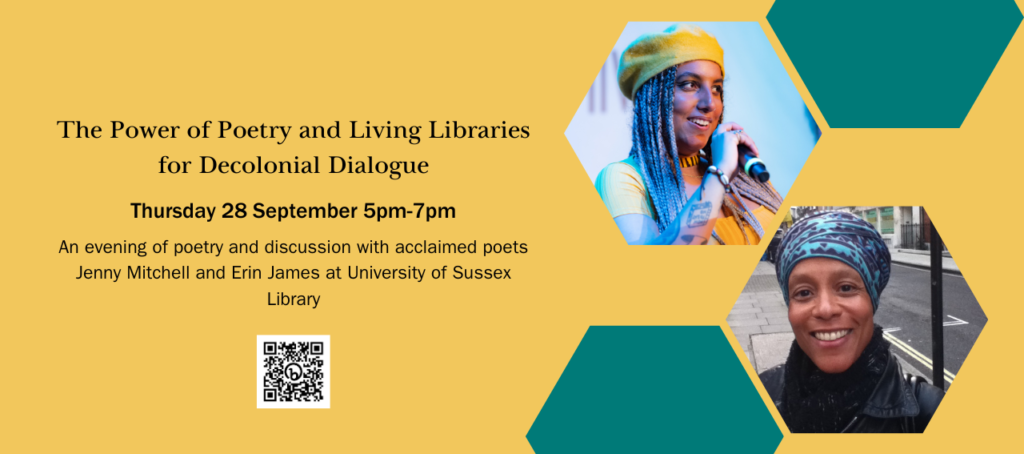
As Black History Month draws to a close (yet Black History must continue to be shared) and I adjust to the turn of the season and new positions, I want to reflect today on The Power of Poetry and Living Libraries for Decolonial Dialogue. This was the title of an in-person event at University of Sussex Library that I was proud to host on 28th September last month, to mark the end of my AHRC-RLUK fellowship and four years working for the Library.
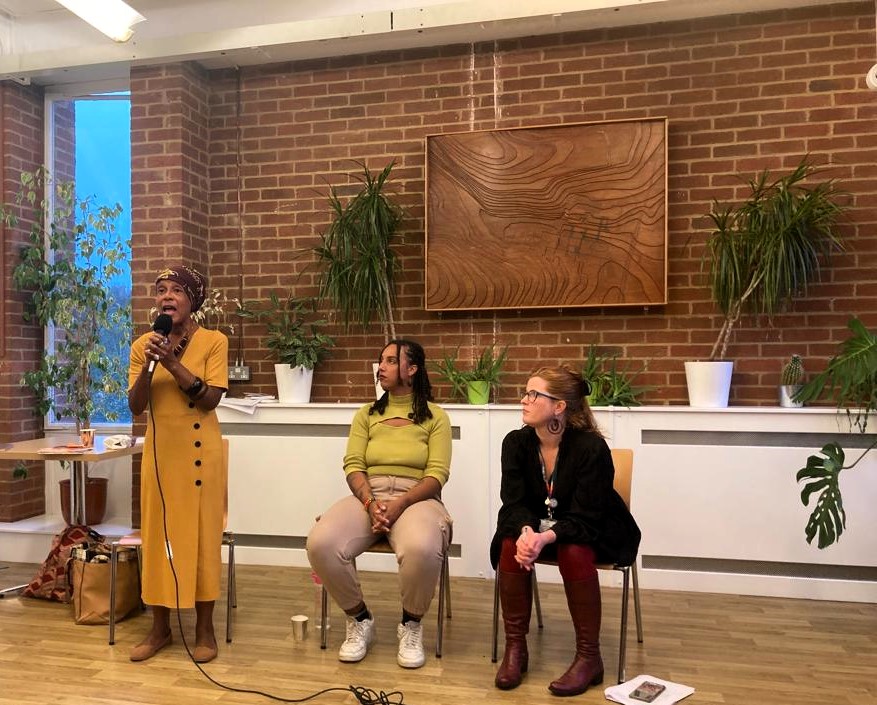
The event centred on the transformational poetic language and insights of two distinguished guests: award winning poets and artists, Jenny Mitchell and Erin James. This year’s Black History Month theme is “Saluting Our Sisters” and the phenomenal work of these talented poets is most certainly worth saluting in this vein.
Jenny Mitchell is an alumna of the University of Sussex who has earned recognition and multiple awards for her contributions to the world of poetry. Notably, she was awarded the Gregory O’Donoghue Prize in 2023 for a single poem. Her second collection, “Map of a Plantation,” received the Poetry Book Awards in 2021 and is now part of the syllabus at Manchester Metropolitan University. Mitchell’s best-selling debut collection, “Her Lost Language,” was featured in Poetry Wales’ list of 44 Poetry Books for 2019. Her latest work, Resurrection of a Black Man, has received widespread acclaim, with three prize-winning poems and a feature on the U.S. podcast Poetry Unbound. Just last week, Jenny was also a winner of the Bread and Roses Poetry Award 2023.
Erin James is a Brighton-based multi-disciplinary artist, known for merging art and activism in their diverse range of art, including poetry, DJing, photography, zine-making and curation. They were awarded the 2023 Stuart Hall Fellowship at University of Sussex, where they developed the creative research project The Live Archive. Erin’s work focuses on poetry and music as alternative mediums for academic research and archiving. Themes of their work include mental health, activism, the use of joy as an antidote to hate, and the normalisation of ‘stigmatised’ subjects.
For this event featuring Jenny and Erin’s work, we gathered together with a diverse audience of sixty people, a mixture of current and former Sussex students and staff and local community members in the large open plan area of the Library Café (which once upon a time was the University bookshop). The early evening autumnal light and lively energies of starting a new academic year filled the space and formed a fitting setting for the stunning poetic performances and reflections provided by Jenny and Erin.
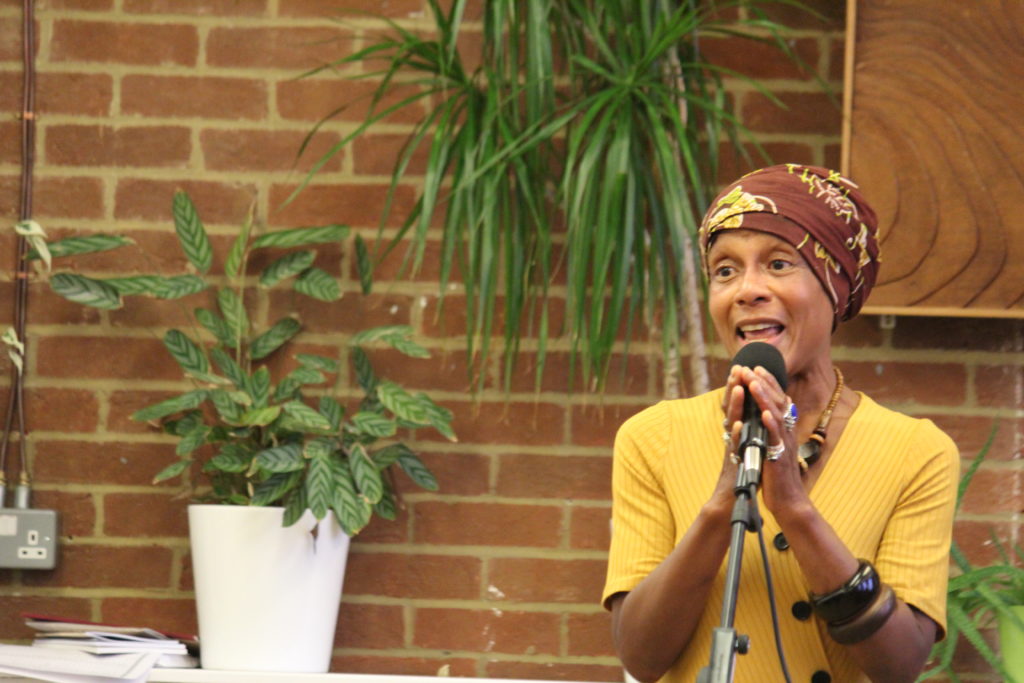
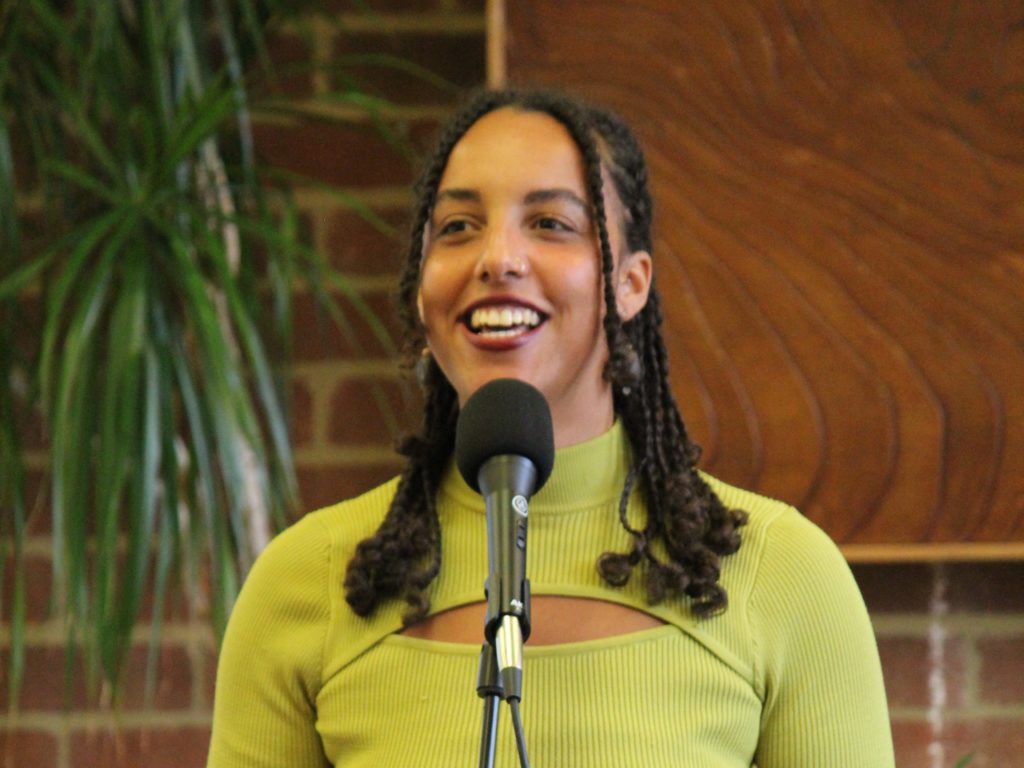
Erin and Jenny took it in turns to recite a selection of their phenomenal poems, before entering into a reflexive conversation about the roles that libraries, archives, reading and education have played in their lives, inflected with the entwined themes of race, gender, and legacies of colonialism and British transatlantic enslavement. Some of the issues raised in the dialogue included the power of oral storytelling, and the damage done to those who were, for reasons beyond their control, unable to access mainstream education that still privileges the written word above all else. One of the central and resounding themes was the ways in which poetry can be both liberating and an act of reclamation.
The poems Jenny recited were drawn from all three of her collections, including “Lost Child”, “Song for a Former Slave”, “Black Rapunzel”, “The Seamstress” (dedicated to her grandmother), and “Black Men Should Wear Colour” (dedicated to her brother Mark). Her final poem was one written this year, called “Academia” with reference to her past experiences as a student at Sussex.
Academia
by Jenny Mitchell
This is not a campus for the poor. The posh,
in drab designer clothes, labels on the outside –
wealth flapping in the sun. A coddled generation,
prepared to have it all, held up as leaders
of the world, when I hail from a council flat –
the first child in my family to ever sit exams.
The rich must sense I do not know my arse
from elbow – how to cook a bechamel.
Is it the same as a white sauce? Black girl
begins to hide her voice – How now brown cow?
Call me Eliza Doolittle. Who knows about
the rain in Spain? I’ve never been abroad.
Debt is accrued by lounging in a coffee shop –
scones filled with cream and jam, hot chocolate
poured up to the brim. I’m awed by silver spoons
between thin lips. The upper one is always stiff.
Money sharpens vowels – a cut-glass voice,
words I long to speak trapped down my throat.
(First published by Poetry Wales 59.1 Summer 2023 , and re-published by Culture Matters 16 September 2023.)
I was particularly struck by the image of the ‘béchamel’ or ‘white sauce’ in this poem, which I interpreted as a viscous medium of whiteness that conditions the structures and cultures of the university, too often marginalising or silencing Black voices and student experiences. Jenny’s voice has certainly cut through that medium, however, with power and poise that speaks volumes about social and racial injustices. Recurring leitmotifs of ancestral voices like musical notes sutured in to the hems and seams of resurrected garments reverberated into the library space with a sense of reckoning as Jenny recited her poems. The metaphor of seams and stitching also made me think of the binding and spines of books that fill library stacks, yet the power of the human voice through poetry shared aloud has an unbinding force, liberating the words from the page and from the suffering of its subjects.
Erin’s poetry recitals had a similarly emancipatory force, bringing to life the Library and the Archive in all its interdisciplinary multiplicity and imaginative multidimensionality. They began their set with the amazing methodological poem from their Stuart Hall Fellowship project completed at Sussex earlier this year, The Live Archive, an excerpt of which is reproduced below:
Welcome to The Live Archive
A living breathing poem –
event, idea, method, inquiry, feeling and emotion
I’m Erin: artist / researcher
Reality unearther
Archivist worker
And social-justice-searcher
I make music out of language
Translating words I’ve nurtured
And I’m here to share my research
I’ve been looking at how poetry can be used as research
How art can contribute to more alternative, accessible, decolonial, non-traditional
unimaginably re-positional forms of research
What education can look like I am reimagining,
As well as who it can include and what traditions we are challenging
It’s important to understand this work is not just my own
Here lies a history far bigger than what can easily be known
This is a legacy so deep I am trying to break open
So with each word that is spoken
Please hear not just my voice
Hear everyone and everything that influenced this choice
See all the images not archived, excluded and left out
Taste the blood of papercuts of pages turned and sources found
Feel the grief of every soul with seeds but no soil left to sprout
I have the privilege of being heard in a way that many others have not
So let this research be for every single story that was lost
Read the full poem and listen to an audio recording on Erin’s website here.
Erin went on to share a powerful poem called “The Gender Binary is a Tool of White Supremacy” which explored the beauty and diversity of pre-colonial gender fluidity and how this needs to be reclaimed in current oppressive and reactionary cultural contexts. This was a found poem, a collage-like form which, as Erin highlighted, is a creative way of playing with the politics of citation for restorative ends. Erin’s final poem explored the and diasporic complexity of ancestral and cultural heritage and how to dream and demand a politics of refusal and liberation within and beyond the colonial structures that divide us.
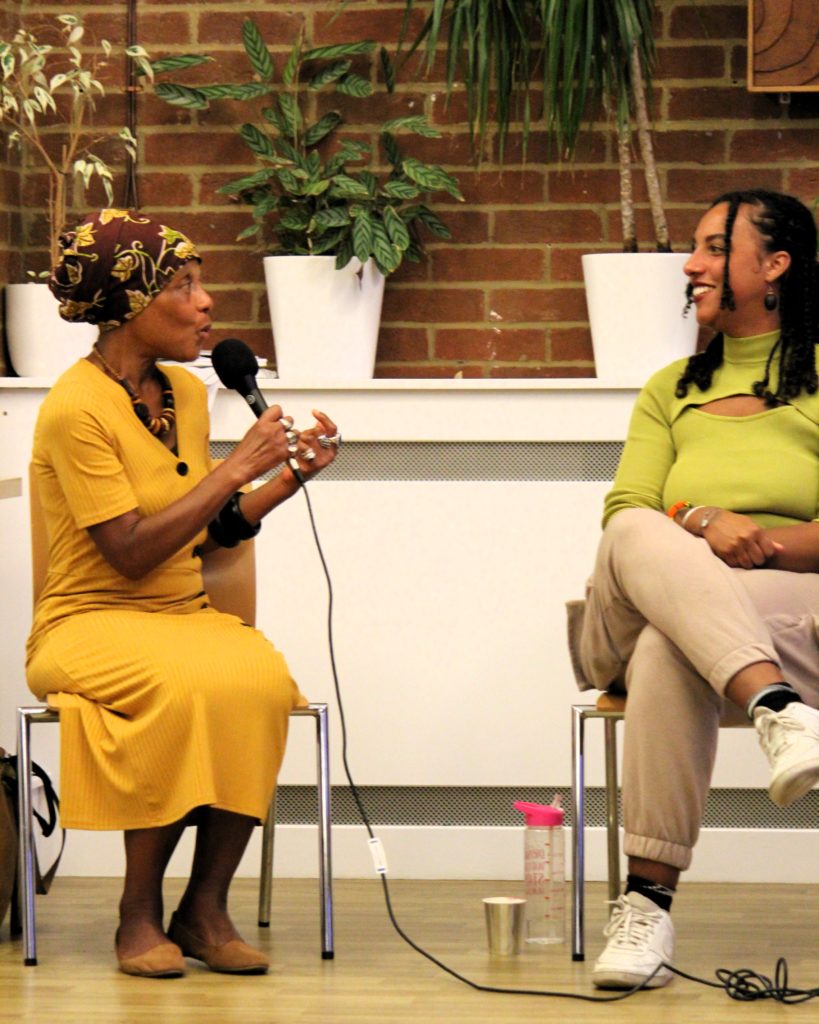
The subsequent dialogue between Erin and Jenny was full of intersectional and inspirational synergy. They each reflected on their experiences of libraries and archives in public and educational settings, with Jenny reflecting on how important public libraries were to her in childhood, as both a safe space away from home and school and as a way of accessing literature beyond the curriculum. The university library was less of a feature in her learning at Sussex, but libraries became very important again post-university life when Jenny engaged in deep research on British transatlantic enslavement, informing her three poetry collections. She has also worked with libraries a lot in her outreach and engagement work as a writer and workshop leader. Erin shared how whilst they have always loved reading, developing this through formal further and higher educational routes was not a pathway that worked for them, but libraries and archives in their most expansive and public sense have been a huge part of their self-education, feeding into a process of ‘reclamation’ of language, history and life. During Erin’s Stuart Hall Fellowship at Sussex, the Library and its archives and special collections became key nodes feeding in to Erin’s re-imagination of what a living archive is and can be.
Jenny reflected with Erin on the power of the oral their work. The way the audible human voice can transcend the confined of the covers of a book was palpable for the audience as we listened to their recitals and subsequent conversation, and influenced some fascinating questions posed by members of the diverse audience, who were encouraged to share their thoughts in a safe and inclusive environment. There was a discussion about the ways in which books can have their own kind of agency through the ways in which readers connect with them, a notion of certain texts finding us or even ‘reading’ us, rather than us reading them, which was particularly intriguing. There was also a question about the importance of multiple modes and formats for ‘reading’ which is very important for neurodivergent library users in particular, with a reminder that readers can exist at the margins of texts and institutions, as well as minoritised authors and subjects of books or collections.
The event closed with a sense of an appetite for further dialogue on all these issues and more. There was much thanks and praise for the power of poetry unleashed by Jenny and Erin, and for the value of opening up the library space for these kinds of inclusive forms of listening, speaking and reclaiming of the words connect us as living and breathing archives.
With many thanks to RLUK for funding this event.


[…] on from Decolonial Maps of Library Learning blog 31 October 2023 by Alice […]